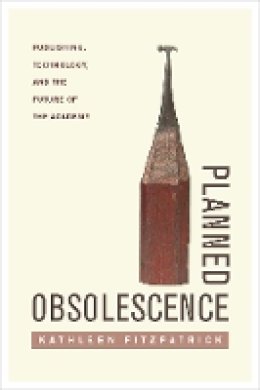
Stock image for illustration purposes only - book cover, edition or condition may vary.
Planned Obsolescence
Kathleen Fitzpatrick
€ 92.29
FREE Delivery in Ireland
Description for Planned Obsolescence
Hardcover. A provocative exploration of the new modes of scholarly communication Num Pages: 256 pages, 16 b&w illustrations. BIC Classification: JNM. Category: (P) Professional & Vocational. Dimension: 162 x 237 x 20. Weight in Grams: 542.
Choice's Outstanding Academic Title list for 2013
A bold approach to re-envisioning the future of academic publishing
Academic institutions are facing a crisis in scholarly publishing at multiple levels: presses are stressed as never before, library budgets are squeezed, faculty are having difficulty publishing their work, and promotion and tenure committees are facing a range of new ways of working without a clear sense of how to understand and evaluate them.
Planned Obsolescence is both a provocation to think more broadly about the academy’s future and an argument for re-conceiving that future in more communally-oriented ways. Facing ... Read more
Product Details
Format
Hardback
Publication date
2011
Publisher
New York University Press United States
Number of pages
256
Condition
New
Number of Pages
256
Place of Publication
New York, United States
ISBN
9780814727874
SKU
V9780814727874
Shipping Time
Usually ships in 7 to 11 working days
Ref
99-1
About Kathleen Fitzpatrick
Kathleen Fitzpatrick is Professor of Media Studies at Pomona College and founding editor of the digital scholarly network MediaCommons. She is the author of The Anxiety of Obsolescence: The American Novel in the Age of Television and has blogged at Planned Obsolescence since 2002.
Reviews for Planned Obsolescence
Fitzpatrick is well qualified to discuss alternate forms of publishing and unexpected futures for the academy...Chapters titled 'Peer Review,' 'Authorship,' 'Texts,' 'Preservation,' and 'The University' methodically dismantle arguments for the status quo, with sections debating accepted beliefs and practices such as the anonymous basis of peer review; recognizable, individual authorship; for-profit university presses; and the rejection of open access as ... Read more
